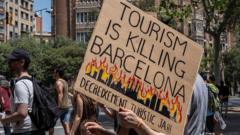In Barcelona, a growing movement of residents and activists decry the rise of over-tourism, amplifying calls for stricter regulations on short-term rentals and housing prices. As locals struggle with inflated rents and housing shortages, the protests highlight the tension between the city's economy reliant on tourism and the needs of its permanent residents.
Residents in Barcelona Rally Against Over-Tourism, Pleading for Balance

Residents in Barcelona Rally Against Over-Tourism, Pleading for Balance
Local protests express mounting frustrations over the impact of tourism on housing and daily life in Barcelona, calling for measures to protect residents.
As tourists snapped photos of the protests in Barcelona on Sunday, demonstrators vocally condemned the influx of visitors with chants urging them to "Go Home!" Tourists dining at cafés were targeted with water pistols, while shops bore stickers asserting the rejection of unwelcome guests. The surge in tourist numbers has left many locals feeling pushed out of their own neighborhoods, prompting a backlash against the significant impact of tourism on housing, affordability, and lifestyle in the Catalan capital.
Marina, a protester holding a banner stating "Your AirBnB used to be my home," voiced her concerns about the escalating rental prices driven by the proliferation of vacation rentals and an influx of expats. She emphasized the need for a management system that doesn't hinder tourism but rather regulates it for the benefit of residents. Over 15 million tourists visited Barcelona last year, a figure almost ten times the city's population, pushing local residents to the periphery.
A 80-year-old local, Pepi Viu, recently faced eviction from her home, a situation many older residents are experiencing as property owners opt for higher-paying tourist rentals. "I feel like I have no protection and it’s upsetting," she lamented, revealing the emotional toll on vulnerable residents. Joan Alvarez, who has lived in his apartment for 25 years, is also fighting to avoid displacement as the increasing pressure on housing forces many locals to seek shelter elsewhere.
Landlords, on the other hand, argue they are being unfairly blamed for the crisis. Jesus Pereda, who leases flats to tourists in the city, maintains that the rising rents are primarily driven by "nomad" workers rather than tourists. He warns of an impending "existential crisis" for Barcelona's economy if tourism is curtailed since it constitutes a significant portion of Spain's GDP.
In response to the growing pressure from activism, local authorities have announced a drastic ban on short-term rentals effective from 2028, which will impact around 10,000 landlords. However, this decision has sparked anxiety among property owners who assert that they fulfill a critical economic role in a tourist-centric city.
As tensions flared during protests, demonstrators expressed their frustrations with local law enforcement, culminating in fiery displays of dissent. Protests against the challenges posed by tourism are being echoed across Spain, and despite the pending influx of summer tourists, the conversation remains focused on finding a sustainable equilibrium between visitor draw and resident welfare.


















